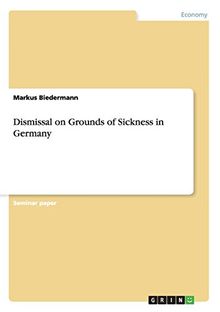
Seminar paper from the year 2015 in the subject Business economics - Business Management, Corporate Governance, grade: 1,3, University of Applied Sciences Frankfurt am Main, language: English, abstract: Dismissal on grounds of sickness in Germany is a subpart of the dismissal on grounds of personal capability.
Generally any illness is not a reasonable condition to dismiss an employee.
However continuous sickleaves or a long lasting illness causes high costs for a company. A specific juridical definition of such a dismissal is not stated in the German law. To address this issue, the law in Germany sets certain frame conditions with a specific testing scheme in three stages for it. During this process, certain circumstances have to be proven in order to legally dismiss an employee.
Four different typical types of dismissal on grounds of sickness exist in the German law, which are divided in long-lasting sickness, permanent incapacity for work, reduced performance and frequent short-term sickleaves of the employee. All of those can lead to a dismissal. The obligatory three-stage testing scheme needs to prove a negative forecast of the health of the employee, a severe harm to the company through the sickness and the company has to balance the interests of the company and the employee.
Along with that, the application of a reintegration management after sickness has to be applied.
Within this process the appropriate participation of the works council according to law and the law of equality has to be respected.
The major burden of proof remains in the whole process on the employer, however the highest risk stays with the employee. As there is no prescribed timeline, a long-lasting law process can harm an employee even more as he has to suffer not only from his illness but also from the financial pressure.